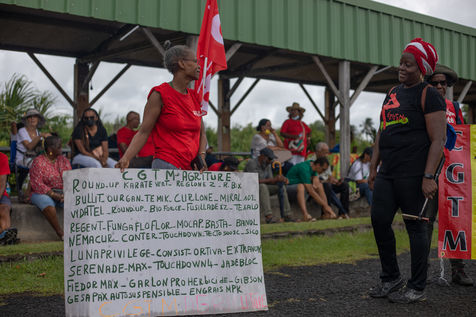Manifestation contre le probable non-lieu dans l'affaire du chlordécone
Le rassemblement qui se voulait "unitaire" par les organisateurs, était donné dans un lieu symbolique ce samedi 28 mai : place du Neg Mawon au Lamentin (centre de l'île). Prévue démarrer à 9 heures, la marche dans les rues de la ville a finalement commencé vers 10h30, malgré les fréquentes averses, pour s'achever au stade municipal Georges Gratiant du Lamentin.
Plus d'un millier de personnes ont répondu à l'appel lancé par plusieurs associations, syndicats et partis politiques. L'objectif de cette manifestation était d'interpeller le gouvernement français en cette période électorale sur les conséquences sanitaires et environnementales du chlordécone, ce pesticide utilisé massivement aux Antilles où il a été autorisé jusqu'en 1993 (bien qu'interdit en France en 1990). Mais aussi de réclamer justice et réparation. Associations et collectivités de Guadeloupe et Martinique ont déposé une plainte pour empoisonnement et mise en danger d'autrui et administration de substance nuisible, en 2006. Mais seize ans plus tard, en mars dernier, les juges d'instruction du pôle santé publique du tribunal judiciaire de Paris ont prononcé la fin des investigations dans l'enquete sur l'empoisonnement des Antilles au chlordécone sans aucune mise en examen. Une issue en non-lieu, déjà envisagée dès 2021, paraît de plus en plus probable. Ce qui est inacceptable pour les Martiniquais qui s'indignent contre "un déni de justice". "Non au non lieu, oui à la justice, oui à la réparation" était le mot d'ordre avant le départ de la marche.
Demonstration against the probable dismissal of the chlordecone case
The gathering, which was intended to be "unitary" by the organizers, was given in a symbolic place this Saturday, May 28: place du Neg Mawon in Lamentin (center of the island). Scheduled to start at 9 am, the march through the streets of the city finally began around 10:30 am, despite the frequent showers, to end at the municipal stadium Georges Gratiant of Lamentin.
More than a thousand people responded to the call launched by several associations, unions and political parties. The objective of this demonstration was to question the French government during this electoral period about the health and environmental consequences of chlordecone, a pesticide used massively in the West Indies where it was authorized until 1993 (although it was banned in France in 1990). But also to demand justice and reparation. Associations and communities of Guadeloupe and Martinique have filed a complaint for poisoning and endangering others and administration of harmful substance, in 2006. But sixteen years later, last March, the investigating judges of the public health division of the Paris judicial court pronounced the end of the investigations in the inquiry on the poisoning of the West Indies with chlordecone without any indictment. A dismissal of the case, already envisaged in 2021, seems more and more likely. This is unacceptable for the people of Martinique who are indignant against "a denial of justice". "No to the dismissal, yes to justice, yes to reparation" was the slogan before the start of the march.

















































